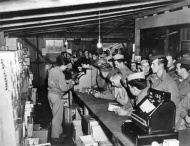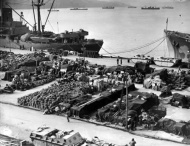Events In History
-
 1 April 1987State-owned enterprises are born
1 April 1987State-owned enterprises are bornThe State-Owned Enterprises Act heralded a major overhaul of the public sector and was a key part of the strategy of economic liberalisation known as 'Rogernomics'. Read more...
-
 1 October 1986Goods and Service Tax Act comes into force
1 October 1986Goods and Service Tax Act comes into forceAdding 10% to the cost of most goods and services, GST was a key part of the economic reforms of the fourth Labour government that were dubbed 'Rogernomics' after Minister of Finance Roger Douglas. Read more...
-
 28 March 1983Signing of CER agreement strengthens trans-Tasman trade ties
28 March 1983Signing of CER agreement strengthens trans-Tasman trade tiesNew Zealand and Australia formally signed the Closer Economic Relations (CER) agreement, strengthening trade ties between the Tasman neighbours. Read more...
-
 30 July 1979Carless days introduced
30 July 1979Carless days introducedCarless days for motor vehicles were introduced to combat the second oil shock of the 1970s. They did little to reduce petrol consumption and were scrapped in May 1980. Read more...
-
 10 July 1967NZ adopts decimal currency
10 July 1967NZ adopts decimal currencyPounds, shillings and pence were replaced with dollars and cents − 27 million new banknotes and 165 million new coins. Read more...
-
 15 February 1882First shipment of frozen meat leaves NZ
15 February 1882First shipment of frozen meat leaves NZThe Dunedin sailed from Port Chalmers with New Zealand's first refrigerated cargo destined for Britain, pioneering the frozen meat and dairy trade that would become the cornerstone of the economy. Read more...
-
 21 January 1859Ice comes to Nelson
21 January 1859Ice comes to NelsonEnjoying a cold drink on a hot afternoon was not always as simple as adding ice from the freezer to water from the refrigerator. Once the ice made a much longer journey. Read more...
Articles
Korean War

New Zealand was involved militarily in Korea from 1950 to 1957, first as part of the United Nations 'police action' to repel North Korea's invasion of its southern neighbour, and then in a garrison role after the armistice in July 1953.
- Page 1 - New Zealand in the Korean WarNew Zealand was involved militarily in Korea from 1950 to 1957, first as part of the United Nations 'police action' to repel North Korea's invasion of its southern neighbour, and
The Vogel era

In 1870, Colonial Treasurer Julius Vogel launched the most ambitious development programme in New Zealand’s history. The ‘Vogel era’ was a decisive moment in New Zealand’s 19th-century transformation from a Māori world to a Pākehā one.
-
Page 2 – New Zealand in 1870
Three decades after the signing of the Treaty of Waitangi, New Zealand’s two main islands were like two different countries.
-
Page 3 – Vogel's vision
In June 1870, Vogel unveiled the most ambitious public works and assisted-immigration programme in New Zealand’s history.
-
Page 4 – Building Vogel's railways
Julius Vogel wasn’t the first colonial politician to promise public works and immigration on the back of borrowed money. But the early 1870s offered better prospects for
-
Page 5 – Vogel's legacy
After the initial enthusiasm of the 1870s, Julius Vogel’s reputation suffered in the 1880s when New Zealand’s economy slumped into a long depression that was triggered by an
Feeding Britain

From March 1915 the British government purchased New Zealand’s entire output of frozen meat to help ensure a regular flow of food to the British public and the British Expeditionary Force in France and Belgium.
- Page 1 - Feeding BritainFrom March 1915 the British government purchased New Zealand’s entire output of frozen meat to help ensure a regular flow of food to the British public and the British
The Merchant Navy

3 September is Merchant Navy Day, which was first officially commemorated in New Zealand in 2010. The date marks the sinking of the first Allied merchant ship in 1939, just hours after the Second World War began. This is the story of the 'fourth service' at war.
-
Page 3 – Under the Southern Cross
New Zealand's domestic shipping industry played a vital role during the war. A small tributary of the vast British shipping empire, it was largely confined to 'short-sea' (
The 1970s

The 1970s were an era of economic and social change. Global oil shocks hit the New Zealand economy hard, while protests against the Vietnam War and nuclear testing continued. A new generation of activists raised questions about race relations, sexuality and the welfare system in New Zealand.
- Page 2 - OverviewSummary of what NZ was like in the 1970s, including our population, economy, popular culture, protest issues, politics and sporting
The New Zealand Legion

The year 1933 witnessed an unprecedented eruption of protest amongst urban businessmen and professionals in New Zealand. The most prominent manifestation of this protest was a radical conservative movement named the New Zealand Legion.
-
Page 3 – The desire to 'do something'
The New Zealand Legion was much more than a conservative protest against the coalition government. It was the focal point for a wide range of individuals, overwhelmingly from
-
Page 5 – Ideology
While the New Zealand Legion’s initial policy was deliberately vague, it contained several key elements that were central to the movement’s ideology throughout its life.
-
Page 6 – Internal conflicts
Because the New Zealand Legion was such a catch-all movement for various ideas and grievances, it was inevitable that its inherent contradictions would surface.
-
Page 7 – Decline
Internal divisions and resignations over policy had considerably sapped the New Zealand Legion’s strength by the beginning of 1934.
The 1960s

Five decades ago most Kiwis enjoyed a standard of living that was the envy of other nations. During the 1960s the arrival of TV and jet airliners shrank our world, and New Zealanders began to express themselves on a range of international issues, including opposition to the Vietnam War.
-
Page 10 – 1967 - key events
A selection of the key events in New Zealand history from 1967
US Forces in New Zealand

Seventy years ago, in June 1942, the first American soldiers landed on New Zealand soil, to begin an 'invasion' which would have a profound impact on both visitors and hosts over the next 18 months.
- Page 8 - Economic impactThe presence of thousands of well-paid Americans in the country and a large army to service brought about a minor economic boom in New Zealand and some long-term effects on local
Pacific aftermath

Participation in the First World War changed Pacific Islanders' lives. Returning servicemen had seen the world.
- Page 5 - Economic, social and political impactThe First World War opened the Pacific Islands to the world more than they ever had been
Dominion status

On 26 September 1907 the colony of New Zealand ceased to exist. It became, instead, a dominion within the British Empire.
- Page 6 - New Zealand in 1907What was New Zealand like at the time of becoming a dominion?
Container shipping

Forty-five years ago, on 19 June 1971, the first all-container ship to visit New Zealand arrived in Wellington. Columbus New Zealand was part of a worldwide revolution in shipping. These simple steel boxes would change our transport industry, our ports and how we work and shop.
- Page 5 - Transforming our economyContainers changed everything. Railways ordered fleets of flat-deck rolling stock and ‘daylighted’ tiny Victorian tunnels so they could get through. Truckers bought heavy-duty
Biographies
-
 Vogel, Julius
Vogel, Julius
Premier Julius Vogel's great plan was to borrow heavily to build infrastructure and to lure migrants. It was controversial, but the money and migrants stimulated the economy and created a viable consumer market for producers.
Read more... -
 Sutch, William Ball
Sutch, William Ball
Even before his arrest, trial and acquittal on spy charges in the 1970s most New Zealanders had heard of Bill Sutch. He was a prominent citizen – known for his work as an economist, writer, public servant and diplomat.
Read more...
Related keywords
- WW1 home front
- public service
- 1980s
- protest
- robert muldoon
- australia
- international trade
- CER
- great depression
- new zealand legion
- national party
- sidney holland
- nelson city
- ice
- inventions
- cartoon
- shipping
- container shipping
- government
- robert begg
- railways
- julius vogel
- public works
- communications
- assisted immigration
- immigration
- maori land
- 1970s
- cars
- telegraph
- provinces
- land confiscation
- labour party
- international relations
- race relations
- david lange
- roger douglas
- WW2
- bren guns
- reform party
- riots
- united party
- gold
- new zealand wars
- transport
- merchant navy
- port chalmers
- WW1
- cook islands
- niue
- health
- pacific islanders
- cold war
- bill sutch
- spies
- crime
- sport
- dominion day
- school journal
- dominion of new zealand
- 1960s
- paekakariki
- american forces
- 1920s
- popular culture
- poster
- premiers
- newspapers
- wellington city
- pacific war
- wool
- christmas
- public holidays
- disasters
- alcohol
- motor sport
- musket wars
- muskets
- statistics
- korean war
- anzus
- 1950s
-
Main image: Weekend trading protest
Protest against weekend trading by the Shop Employees Union, 1980



















